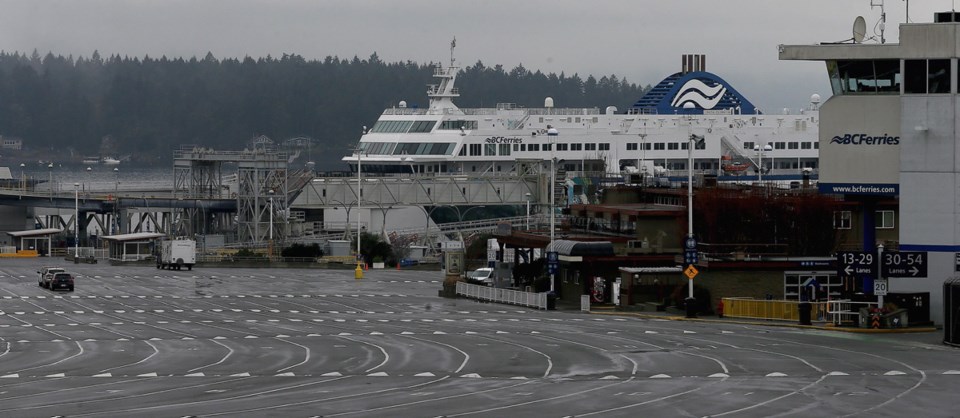B.C. Ferries is negotiating new reduced essential service levels with the province as workers fall ill and traffic plummets by an unprecedented 70%.
An agreement is expected early next week, Mark Collins, B.C. Ferries president and chief executive, said Friday.
Normally, B.C. Ferries is ramping up service this time of year because of spring break, and as Easter and summer vacations approach but service currently operating at its lower winter levels, he said.
The corporation has appealed to the province for a break on its service contract.
“We are going to go below winter levels in some areas,” Collins predicted.
The province mandated this week that B.C. Ferries will maintain essential service levels, but how that will look has not been defined.
�鶹��ýӳ��Island relies on B.C. Ferries to bring 60% to 70% of cargo to the Island, he said.
B.C. Ferries’ contract with the province sees it operate 25 routes with 47 terminals using 35 vessels.
“The government is taking a route-by-route interest in it. Every route will be judged on its merits,” Collins said.
“There will need to be adjustments in capacity to bring it down to essential levels. That will help with the cost situation a bit.”
Many communities are calling for reduced service to help control the spread of the virus, he said.
Revenue from the fare box has dried up since the novel corona- virus pandemic exploded around the globe. B.C. Ferries has asked the public to avoid all non-essential travel.
During the 2008 financial crisis, B.C. Ferries lost about 15 per of traffic over 15 months, Collins said.
With the pandemic, the company has lost 75% of passengers and lost 60% of vehicles in 15 days, he said.
“It’s incredible.
“We’ve got a lot of hard assets, a lot of hardware so a lot of our costs are fixed.”
Collins did not have details available on the financial loss but said. “Right now, our costs are considerably higher than our revenues. It’s certainly eroding our reserves.”
Only commercial traffic, which accounts for about 40% of business, remains strong.
On a recent day, Spirit of British Columbia sailed with just 240 passengers. That vessel is capable of carrying about 2,100 people.
“Ships are sailing around largely empty,” he said.
“I’ve never seen anything like it.”
The priority is to protect crew members, who run the risk of being exposed to the virus, he said. Fewer sailings mean less chance to become infected.
So far, two runs on the Sunshine Coast have been cancelled because of a shortage of staff. “We are very close to seeing more disruptions,” Collins said.
The number of employees off work is running about four times higher than normal, he said.
“That’s our single biggest risk to continued operations — unavailability of people.”
B.C. Ferries is working to keep crews together to try to avoid transmission, said Collins, who praises staff for their dedication.
The corporation has 5,100 employees, with 4,000 of those marine crew members. Service reductions mean that B.C. Ferries will not hire its usual 500 additional staff this summer, Collins said.
As upcoming service levels have not been set with the province it is not known what staff levels may be required.
B.C. Ferries has been absorbing financial losses itself but Collins said talks on that matter will be coming up.
“As we speak, our management team is going over all capital expenditures with an eye to deferring what we can.
“This is going to have such a far-reaching impact that there’s no doubt that the ferry system will have to invest less in the coming few years while we try and get our balance sheet straightened out again.”
Right now, four Island-class ferries and one Salish-class ferry are under construction. Construction is on course for those vessels, Collins said.
Plans for four large ships may have to wait, he said.
“We simply don’t know the long-term impacts yet.”



